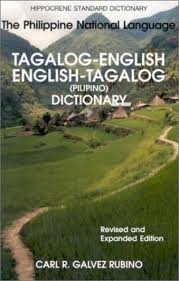
No, this isn’t an ultra-nationalist or racist rant, and sorry if the title sounds that way. In fact, right now I’m having a long and lovely affair with (or rather, rediscovery of) Spanish culture and language. I threw a little farkin’ title up there, so I’ll have your attention when I lash away at ignorant mongers of fake loan words from Spain.
For now, I’ll dwell on merely two of the many pseudo-Spanish words imported into Tagalog-Filipino–some of them having gained currency in recent years, thanks to reporters, writers and editors who don’t know any better.
One is “polisiya,” which more and more writers and speakers in Tagalog-Filipino are misusing to mean “policy,” perhaps on the idle presumption that English words ending in -cy or -sy automatically translate into Spanish words ending in -cia or -sia, and therefore become Pinoy loan words ending in -siya. You know, like democracy=democracia=demokrasya, or fantasy=fantasia=pantasya.
But English policy translates to Spanish política. It’s English police that translates to Spanish policía. In this age of Google Translate, not to mention our rich Spanish-language heritage, the distinction should be very obvious to Filipinos, who after all have been using pulisiya for many generations to mean police and not policy. Also, there are two well-accepted Tagalog terms, patakaran and palakad, that almost exactly maps to the range of meanings covered by English policy (except in the sense of “insurance policy”).
So there’s absolutely no reason why reporters, writers, speakers and even editors would allow this pseudo-Spanish word polisiya to mean policy in Pilipino. It’s confusing, it’s false etymology, it even looks weird.
The other presumed loan word from Spanish is not as popular as polisiya, but I still hear it uttered in such a funny way every now and then. It’s groseriya, which is supposed to mean grocery (the store) or groceries (goods bought from the store). Well, guess what? Sp. grosería means rudeness, gross behavior, or insult. There’s no Sp. grocería.
What is it that makes otherwise intelligent and educated Filipinos adopt such freak words into our beautiful language? Is it mere linguistic ignorance or laziness? There is that, but I don’t think it’s the main cause, for many reasons too long to discuss now. I think it has to do with a tendency to prettify a plain word if we want to dress up the meaning behind the word. Some of us think that patakaran is such a pedestrian term (I think it’s a beautiful word!), so we glorify, even mystify it with polisiya.
And while we’re at it, may I also ask our linguists what it is in our culture that turns Spanish la mierda (“the shit”) into Pinoy lamiyerda (or lakwatsa), Sp. leche (“milk”) into a crisp cuss word, and Sp. tienes (“you have”) into a catchall word that can mean anything under the sun or nothing in particular (as in chorva tienes). I know these transfigurations come from different mechanisms than the one that produced polisiya and groseriya. But I suspect that, deep down, these words are manufactured by the same busy areas of the Pinoy’s frontal lobes that constantly spew out tons of junk and ounces of precious jewels which ultimately reshape our language and culture.
So there. There’s good with the bad, admittedly. But next time I hear someone say, “Aaralin munang mabuti ng Malakanyang kung dapat baguhin ang polisiya,” I’ll strangle their neck and will not relent, despite their pleas of mercy, until they use the correct term and tumawag sa pulisya para kagyat na rumesponde. (There’s another popular reporter’s term, responde, but I think it passes muster as a good and useful loan word.)
P.S. While I was doing a quick Google look-up about lakwatsa, which comes from Philippine Sp. la cuacha (“skip classes”), I came upon this snippet of the book La lengua española en Filipinas: historia, situación actual, el chabacano… by Antonio Quilis and Celia Casado Fresnillo. I’d love to have a copy of this book, if only to drown myself in its rich trove of examples of how Filipinos reshaped the Spanish language through the centuries, of how Sp. seguro (“certain”) became Pil. siguro (“possibly”), how Sp. siempre (“always”) became Pil. syempre (“of course”), and hundreds of other curiosities.


Hi Opi,
Dahil mahilig din akong magmasid sa wika — natuwa ako sa sinulat mo tungkol sa mga MALING salita — isinalin pero hindi malaman kung ano ang basehan. Nagsusulat ako ng reply dahil bukod sa hindi na tayo nakakapg-kape, medyo naiiba ang pagtingin ko dito, at least ang attitude ko.
Siguro dahil hindi ko talagang trabaho ang pagiging editor – bagamat kailangan kong mag-edit ng mga naisulat, halos araw-araw — mas hinahayaan ko kesa pinupuna at itinutuwid ang mga “mali”. Tingin ko balang araw, sa kakagamit ng iba’t ibang bersyon ng salin, may mananaig na syang “tama.”
May isinulat nga ako dati — traysikol o trasikel — dahil sa tingin ko, ganon ang wika — nag-e-evolve, nag-eeksperimento, may pinanggagalingan minsan, kay sa sumusunod sa mga batas na itinatakda ng mga grammarians and linguists. Ang yumaong father-in-law ko, nagagalit sa mga gumagamit ng protektado — kasi ang dapat daw ay protejido … kasi nga ingles na siguro ang pinagbasehan ng protektakdo, pero sa kanya — espanyol pa.
Siyempre kailangan ding punahain kung talagang mali — pati na sa ispeling, pero sa Tagalog, marami ang variations, lalaki? lalake? Mas dapat bang longganisa kay sa langgonisa? Paano yun kung ang isang grupo ng mga speakers ay langgonisa na ang talagang nakagawian? Mali silang lahat? Bakit naging boondocks ang bundok? At nabago pa ang ibig sabihin?
Sa madaling salita, kailan tayo magkakape? At bakit nga ba amerikano ang tawag sa espresso na dinagdagan ng tubig?
Hi Jobs–
Sa tingin ko e marami tayong pwedeng pagkasunduan sa usaping ito, at matukoy kung saan nagmumula ang mga magkaibang pagtingin. Saan tayo magkasundo ng pagtingin?
1. Pagiging liberal sa usapin ng ispeling, basta lang huwag sa proper nouns (sakit-ulo ito sa pasaporte atbp personal records, at sa paghahanap ng tamang lugar sa mapa). Meron akong sariling mga alituntunin para sa consistent spelling, pero di rin ako dogmatiko sa pagsunod.
2. Pagiging liberal sa usapin ng dialectal variations sa bigkas o word formation. Tama ka, halimbawa, sa langgonisa vs longganisa, inilatag vs ilinatag, magkaroon vs magkameron, at libu-libo pang iba.
3. Sa matagalang punto-de-bista, ang mga pwersa ng pagbabago sa lengwahe na nagmumula sa popular usage ay positibo ang ambag. Nagiging mas angkop ang lengwahe sa kondisyon ng pamumuhay, sa mga partikularidad ng ekonomya, pulitika, kultura, teknolohiya, syensya at ideolohiya. Hinding-hindi iyon dapat sagkaan ng grammar, spelling and vocabulary Nazis.
Pero napansin mo na sa #3, pinangunahan ko ng “sa matagalang punto-de-bista.” Kasi, sa tingin ko, sa mas pang-araw-araw na pananaw, dapat merong stable core ang anumang lengwahe para maabot at mapanatili ang isang mataas na antas ng intelektuwalisasyon.
Tama ka, hindi pwedeng idikta ang pagbabagong-hugis ng lengwahe. Pero sa tingin ko, pwede (at dapat) itong sadyang impluwensyahan, laluna sa ilang susing bokabularyo at ortograpiya na ginagamit sa edukasyon at siyensya, sa gubyerno at batas. (Kaya nga ganun na lang ang negatibong reaksyon ko sa “polisiya.”)
Mahabang usapan ito, tiyak ko. Pero sabihin na natin na ang lengwahe ay parang ilog. Alam mong hindi ito pwedeng pigilan sa pag-agos at paghanap ng sariling direksyon. Pero kung gusto mong pakinabangan para sa patubig, pag-andar ng makina, rekreasyon atbp., gagamit at gagamit ka ng angkop na teknolohiya para impluwensyahan ang galaw nito. Ayoko ng geo-engineering, pero ok ako sa community irrigation. Ayoko sa megadam, pero ok lang siguro ang microdams.
Parang ganun din sa lengwahe. At tayong nasa masmidya na pribilehyadong nakakahawak sa powerful tools for shaping language, siyempre, mataas din dapat ang pananagutan natin sa pagpili ng tamang balangkas ng paggamit sa nasabing tools.
Humaba na masyado, Jobs. Dapat nga talaga, magkape na tayo.